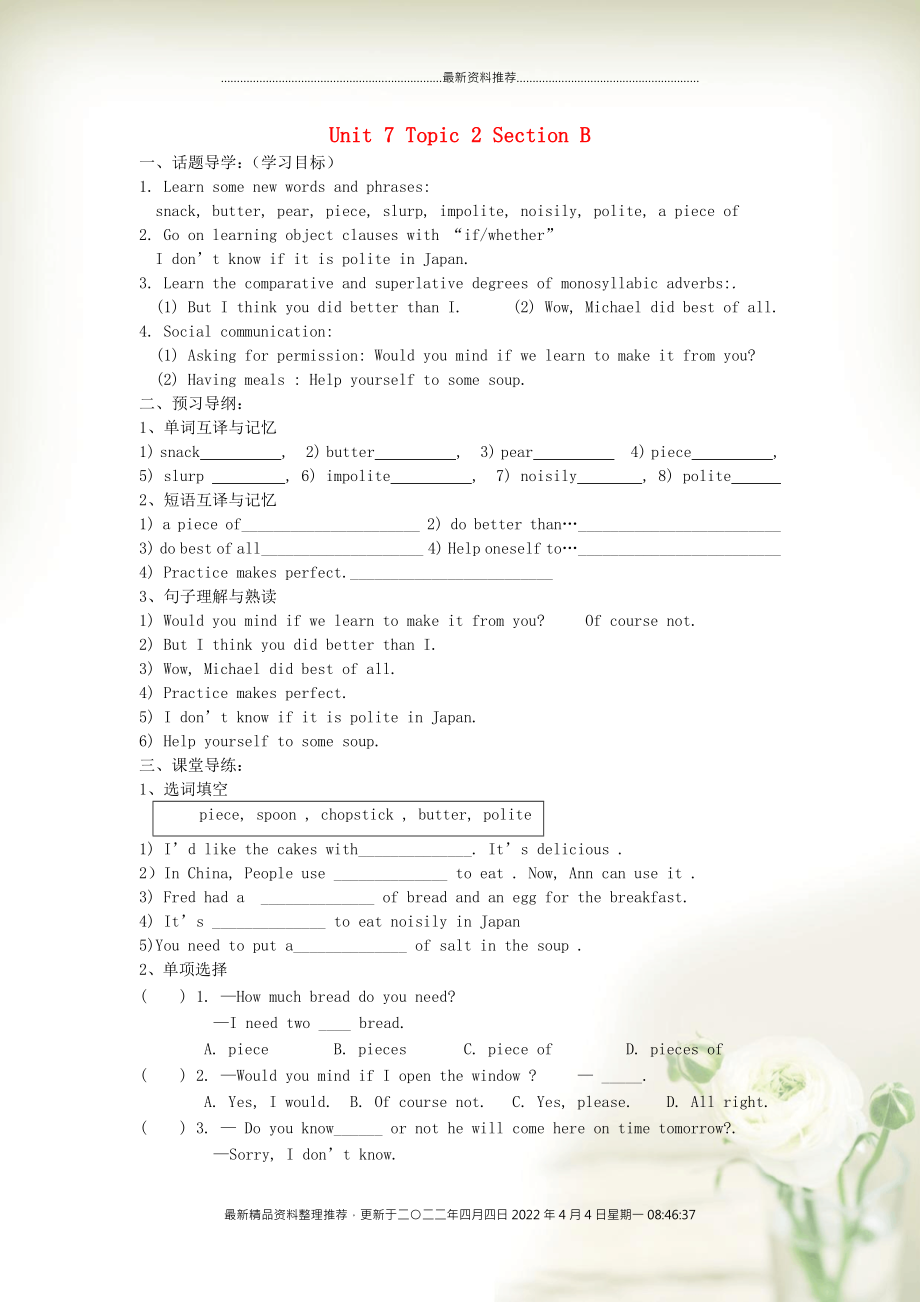《(新新導(dǎo)學(xué)案)廣東省清遠市八年級英語下冊 Unit 7 Food festival Topic 2 I’m not sure whether I can cook it well SectionB導(dǎo)學(xué)案 (新版)仁愛版》由會員分享����,可在線閱讀���,更多相關(guān)《(新新導(dǎo)學(xué)案)廣東省清遠市八年級英語下冊 Unit 7 Food festival Topic 2 I’m not sure whether I can cook it well SectionB導(dǎo)學(xué)案 (新版)仁愛版(3頁珍藏版)》請在裝配圖網(wǎng)上搜索。
1���、……………………………………………………………最新資料推薦…………………………………………………
Unit 7 Topic 2 Section B
一�、話題導(dǎo)學(xué):(學(xué)習目標)
1. Learn some new words and phrases:
snack, butter, pear, piece, slurp, impolite, noisily, polite, a piece of
2. Go on learning object clauses with “if/whether”
I don’t know if it is polite in Japan.
3
2����、. Learn the comparative and superlative degrees of monosyllabic adverbs:.
(1) But I think you did better than I. (2) Wow, Michael did best of all.
4. Social communication:
(1) Asking for permission: Would you mind if we learn to make it from you?
(2) Having meals : Help yourself to some sou
3、p.
二�����、預(yù)習導(dǎo)綱:
1��、單詞互譯與記憶
1) snack , 2) butter , 3) pear 4) piece ,
5) slurp , 6) impolite , 7) noisily , 8) polite
2��、短語互譯與記憶
1) a piece of______________________ 2) do better than…_________________________
3) do best
4�����、of all____________________ 4) Help oneself to…_________________________
4) Practice makes perfect._________________________
3����、句子理解與熟讀
1) Would you mind if we learn to make it from you? Of course not.
2) But I think you did better than I.
3) Wow, Michael did best of all.
4) Practice make
5�、s perfect.
5) I don’t know if it is polite in Japan.
6) Help yourself to some soup.
三�����、課堂導(dǎo)練:
1����、選詞填空
piece, spoon , chopstick , butter, polite
1) I’d like the cakes with______________. It’s delicious .
2)In China, People use ______________ to eat . Now, Ann can use it .
3) Fred had a?________
6�����、______ of bread and an egg for the breakfast.
4) It’s ______________ to eat noisily in Japan
5)You need to put a______________ of salt in the soup .
2����、單項選擇
( ) 1. —How much bread do you need?
—I need two ____ bread.
A. piece B. pieces C. piece of D. pieces of
(
7、 ) 2. —Would you mind if I open the window ? — _____.
A. Yes, I would. B. Of course not. C. Yes, please. D. All right.
( ) 3. — Do you know______ or not he will come here on time tomorrow?.
—Sorry, I don’t know.
A. whether B. when C. if D. that
8�����、
( ) 4. — Who works______ ,Kate, Alice or Mike?.
—Kate works______ than Alice and Mike.
A. hardest, harder B. harder, harder
C. harder, hardest D. hardest, hardest
( ) 5. —Would you like a ______ to eat? —No, thanks.
A. pear B. butter C. fork D. pork
四�����、復(fù)習自測: 補
9�����、全對話
A: Hi, Jane! Let’s make fruit salad.
B: ___1____ .But do you know how to make fruit salad?
A: Sure. 2 .
B: I like banana salad best.
A: 3
B: Of course not. Let’s do it together. First, cut up the bananas. Next, put them in a bowl. 4
Finally, mix(攪和) them all up.
A:
10、 5
B: Thank you. Practice makes perfect..
A.I think you did better than me
B. What about you?
C. Would you mind if I learn to make it from you?
D. What’s your favorite fruit salad?
E. Sound great!
F. Then put the yogurt(酸奶)and honey in it .
1.___________ 2.______________ 3._________
11�����、___ 4. _______________ 5.______________
五��、課文解讀:
1. But I think you did better than I.但是我認為你比我做得更好�����。
better在句中是副詞well的比較級����,意為“更好”。表示“一方比另一方做得更……”要用副詞比較級��,其結(jié)構(gòu)為“副詞比較級+than…”��。如:
She runs faster than me. 她比我跑得更快�����。
2. Wow, Michael did best of all. 哇��,Michael做得最好。
句中best是副詞well的最高級����,意為“最好”。 表示三者或三者以上的比較用最高
12����、級�����,其結(jié)構(gòu)為“the+副詞最高級+in/of…(比較范圍)”����,意為“某人或某物在某范圍內(nèi)最……”,副詞最高級前可省略the �����。如:
Jane jumps (the) highest of the three girls. Jane在這三個女孩中跳得最高�。
3. Practice makes perfect. 熟能生巧。
六���、評價
內(nèi)容
等級
自評
小組長評價
預(yù)習情況
A
B
C
D
課堂表現(xiàn)
A
B
C
D
小組合作
A
B
C
D
Section B
二�、預(yù)習導(dǎo)綱
1、1) 小吃 2) 黃油����,奶油 3) 梨 4)
13、 一塊(片���,張�,件……)5)(喝東西時)發(fā)出嘖嘖的聲音 6)不禮貌的�,粗魯?shù)?)吵鬧地 8)有禮貌的,有教養(yǎng)的
2����、1) 一塊(片,張�����,件……) 2) 比另一方做得更好 3) 做得最好 4) 請自便吃/喝….. 5)熟能生巧�。
3、1) 你介意我們向你學(xué)習制作它嗎�����? 當然不。
2) 但是我認為你比我做得更好�����。
3) 哇���,Michael做得最好��。
4) 熟能生巧�����。
5)我不知道在日本是否禮貌。
6)請隨便喝點湯����。
三、課堂導(dǎo)練:
1�����、1) butter 2) chopsticks 3) piece 4) polite 5) spoon
2. 1----5 DBAAA
四�、復(fù)習自測
1----5 EDCFA
最新精品資料整理推薦,更新于二〇二二年四月四日2022年4月4日星期一08:46:37
 (新新導(dǎo)學(xué)案)廣東省清遠市八年級英語下冊 Unit 7 Food festival Topic 2 I’m not sure whether I can cook it well SectionB導(dǎo)學(xué)案 (新版)仁愛版
(新新導(dǎo)學(xué)案)廣東省清遠市八年級英語下冊 Unit 7 Food festival Topic 2 I’m not sure whether I can cook it well SectionB導(dǎo)學(xué)案 (新版)仁愛版

